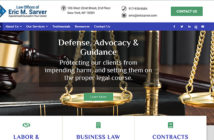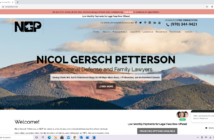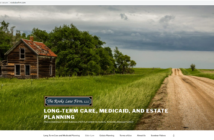Highly-detailed information on how each of the many online legal directories pulls for this multi-specialty firm.
Christian Denmon is co-owner of Denmon & Denmon Law firm in Tampa, Florida. He focuses on divorce and personal injury law while his partner Nicole Denmon focuses on criminal defense and estate planning. They have offices in Tampa, Clearwater, and New Port Richey, serving Hillsborough, Pinellas, and Pasco counties.
Mr. Denmon is an author with bylines all over the Web, including at Huffington Post, Law Street Journal, and several directories where he has paid and non-paid listings.
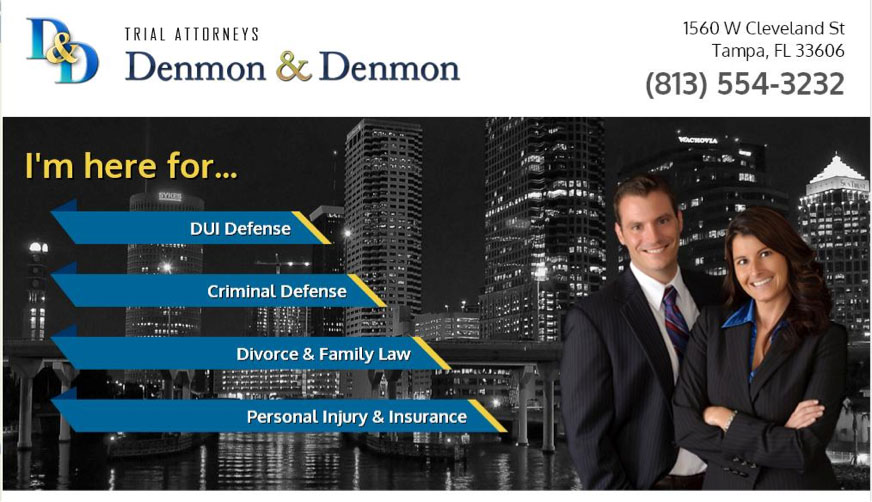
Speaking candidly about which directories work for him and which do not, Mr. Denmon has a lot to teach young attorneys, solo practitioners, and small firm lawyers about navigating the sometimes confusing web of online directories. His insights into primary, secondary, and tertiary data sources alone are well worth your reading time. The biggest takeaway from this case study is to work on building your trust indicators. It’s the key to success with directory listings.
What kind of marketing works best for you in generating new leads for your practice?
I’ve received good online leads from Google+ Local and Google Places but also, to an extent, the long tail information stuff in Google search.
Directory-wise, I get a very good return from AVVO. I do lead tracking, answer legal questions, and also do some advertising, as well. My return is pretty good. I’ve done Lawyers.com for a couple of years, but it’s not very good. I’ve got a couple of cases, a couple of good cases, but it’s not as good as AVVO. AVVO is probably the best as far as directories go. In rural settings, it’s the Yellow Pages.
I operate in three counties with offices in Tampa, Clearwater, and New Port Richey. Pasco County is rural. People there use Yellow Pages. The Yellow Pages directory is the third best one. The average age of its users is 62. They’re used to using the print Yellow Pages, so their instinct is to go to the Yellow Pages online.
2. Can you trace your leads directly to directory listings or do your clients come to you through a variety of means including directories?
I use a software called Ignite. It’s very, very helpful. Before, I was having my staff ask clients where they heard about me and tracking it on Excel. But Ignite is a lot better, a lot more effective. The software itself is very powerful.
I have three different phone numbers and I can track all three numbers. There’s a phone number for each office. I have a phone number for my Lawyers.com listing and a different one for my AVVO listing.
When those numbers are called, Ignite picks up on it and tracks the phone call. But for those offline things, I can assign a different phone number. It’s pretty powerful and easy to use.
The software is actually in the cloud. I track it into my phone system. The system auto-populates a contact into the software and e-mails me to let me know, so I know the moment someone calls me. It costs $199/month. I get it for free because AVVO made me a deal.
With Ignite, you can track whatever you want with Javascript. You can technically track any online profile. You can track by landing page, if you want to. I haven’t done that, but the software is really, really powerful. I sampled it and decided against it, then AVVO gave it to me for free. Now that I use it as much as I do, it’s really worth it. You know exactly where you’re spending your money.
A lot of online stuff costs money, but some of it is just effort. You don’t know what works until you track it. Ignite helps me figure out my cost per lead.
3. What specific tactics or strategies seem to be working best for you?
You try to get your practice areas in there so the consumer knows what you do. If you take a look at AVVO, you can see why it works. It’s mobile-friendly, it’s not cluttered like a lot of the older directories are, and it’s a well-designed website.
It’s a great model of what you can do on your own site.
I don’t spend too much time on it. I’m not active, but I have a presence. I answer a couple of questions a month and do some advertising with them. It’s a three-month commitment for a flat rate. I’m not sure where they came up with the number. It is geographical based.
4. What other directories are you with?
I will tell you this, you don’t get much out of most of them. Even Yelp. Or Angie’s List. They don’t like lawyers. Angie’s List got rid of all their lawyer listings. They don’t like lawyers over there.
I can’t say for sure, but I don’t think I’ve ever had a client come in and say they came from Yellowbot. I do have a directory listing in yellowpages.com. I might have had one or two leads come from there, but it’s not really about that. It’s about letting Google know that I’m there. Google will see the citations and that increases your exposure in Google.
What I don’t do is, which I’ve heard is better than Lawyers.com, is FindLaw. I have a directory listing on FindLaw, but I do not have a paid listing on FindLaw. You can track it if you’re doing paid advertising, but not with just a directory listing.
I have tried Lawyers.com and Hubbell, but their metrics are not consistent with reality.
I did use Nolo for a period of time. Their directory opportunity is a pay-per-lead type of gig. I paid $17 for a “divorce” lead and $13 for a “family attorney” lead. Not only was I not getting quality leads, but I was getting bad leads. People were calling me up expecting me to do pro bono work. I’ve got enough pro bono work. I don’t need any more. I want to get paid.
You have to be careful with directories because they will promise you leads, but the leads you get are not quality leads. They get people to come to the site with terms like “cheap lawyer” and “inexpensive legal services.” They will advertise for cheap lawyers and those aren’t good leads.
A list of Christian Denmon’s directory listings include:
- AVVO
- JDSupra
- Nolo
- Yellowpages.com
- Yellowbot
- Yelp
- Lawyers.com
- Google+ Local
- Yahoo! Local
- Bing Local
- ThirdAge
- LawGuru
- Martindale-Hubbell
- Manta
- Yellowbook
This is just a sampling of online directories where Christian Denmon has his name. Some are general Yellow Pages type of directories and others are specific to the legal profession. Mr. Denmon is also active on all the major social networks.
5. You have your name in a lot of directories. How important are reviews on these directory sites?
Very important. If someone is going to a directory to find an attorney and there is someone else they can choose from, people are going to pick the attorney that has the highest level of trust. People want to trust you. For that reason, reviews are important.
We always do a good job for our clients. We ask them to review us. We’ll tell them, “You don’t have to, but if you will, go online and give us a review.” Clients are more than happy to do that. Some people are more private about it, but some people are less private and willing to leave their name. Those reviews could be tied to their Google+ profile, so there is instant credibility with that.
Yellowbot is bringing in reviews from other places on the Web. You’ll see I have 13 reviews, but they’re being pulled in from SuperPages, Best of the Web, and Lawyers.com. Those help a little bit, but not a lot.
The ones that help me the most are Google+ Local, Yahoo! Local, and Bing Local, because they are trust verified. If you spam Google, they’ll delete it. They’ve eaten some of my good reviews. Google is overly concerned that the real reviews stay pure. People look at them and know if they’re real reviews or not. Plus, if they’re tied to a Google+ profile, then those are really helpful.
6. Do you incorporate any online marketing tactics in conjunction with your directory listings? If so, how are they working out for you?
I have tried pay-per-click advertising. The problem with PPC right now is it’s getting so expensive per lead. If you have bankruptcy ads and you paid $1,500 per lead, it’s not worth it. You need to draw in a big client for that to make you any money.
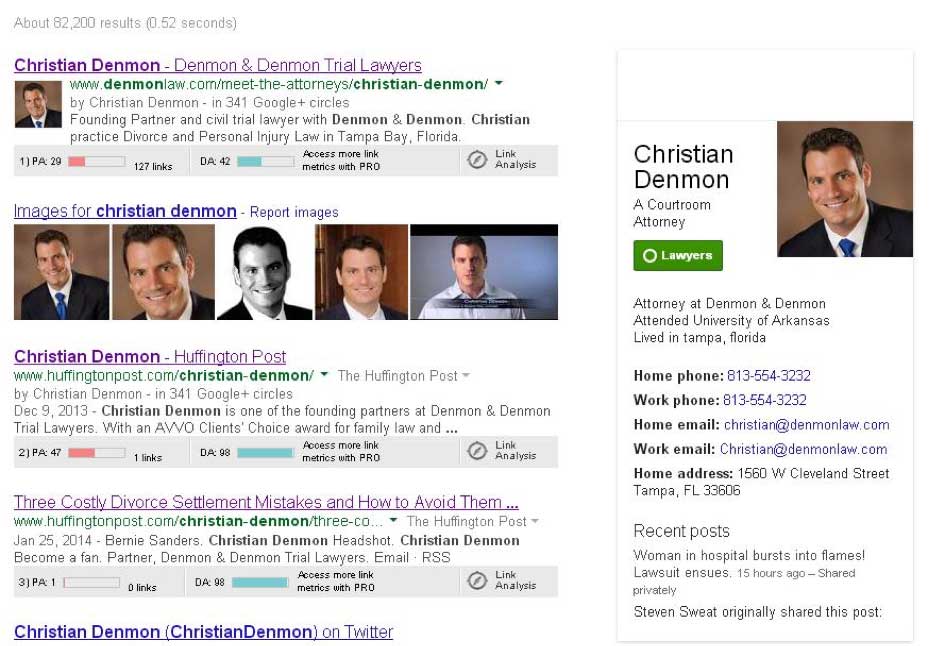
If you’re in a market where the ads are not as expensive, for instance a rural market, then that’s better. If you’re paying $20 a click and fewer people are clicking the ads then you have a higher conversion rate. That’s better.
A lot of attorneys are running ads but aren’t tracking and analyzing the numbers. It’s like an arms race. They better be getting huge cases off those ads. Otherwise, they’re off the scope of profitability.
For me, I stopped running PPC. I’ll test it again in a couple of months. I ran a test for a couple of months and it just wasn’t worth it. But that’s the beauty part of it. You can tell if it’s worth it or not. The takeaway is, you have to get involved in analytics. Crunch the numbers. You can know if you’re making money or not.
I’m probably going to turn it on for the rural market. The reason I haven’t is, I’m going to make an e-book with a targeted domain name and run PPC for informational queries. That’s much cheaper than going after the “hire me” legal terms. They’re much more competitive. I’m excited about the e-book because, with analytics, I can know exactly how the PPC is working. I can know if it’s making me money or not.
I’m also on social media, but I’m not great at it. The only thing I’m sharing right now is if I have something of value or I have a web page that I want re-indexed, then I’ll share it on Google. But it has to be really good stuff, not that generic stuff everyone else is posting.
Then there’s Google Authorship. I think it helps, but I wouldn’t be able to tell you how. I had a local lawyer tell me, “I see you’re writing for Huffington Post and About.com.” That left an impression on him. It’s possible that legal clients, before they hire an attorney, will look at your Google+ profile and your Facebook page before they hire you. I read an article that said something like 72% of consumers do that. I wouldn’t be surprised if that’s true and that’s a good thing.
I will say this: The markup adds a picture next to your links on Google’s search page. That’s a good thing. Google says posts on Google+ don’t help you with SEO, but that doesn’t mean they won’t tomorrow.
They want to show the best search results. They want to show the best authorities in every niche. How can they do that unless you are authoring quality content in high profile places? You have to put your trust indicators out there. Google+ is a great place to do that. So Google Authorship can’t hurt. If I hear other lawyers mentioning it, then maybe clients are noticing too.
8. How would a lawyer go about getting started with directory listings if they wanted to increase their exposure to potential new clients?
Start by going to getlisted.org. It’s wonderful because it gives you the top 10 or 15 major data sources. You have your major data sources and your secondary and tertiary data sources.
There are four big ones. They spin out your listings to all of the other sites. One of them is Acxiom. Yellowbot and all the other directories pick up their information from these four sources. Even Google picks them up. David Mihm wrote about them. If you get right on those, in six to nine months you’ll be everywhere. Even worse, if you get it wrong, some day you’re going to look at it and Google is going to start pulling your reviews out. Fix those. Claim those four primary data sources: Infogroup, Acxiom, Localeze, and Factual.
Second to those are the search engines — Bing, Google, and Yahoo! Take ownership of them and tidy up your profiles 100%. It matters because it determines if you are findable. From there, go to the next level and start picking up citations. Those are your third level information sources, which include the low-level directory sites like Yellowbot.
Yellowpages.com does get spun out to 40 or 50 other ones. I had a wrong phone number in there and it took me a year to clean it up. So fix that stuff.
The tertiary level directories — at that point, you can claim them yourself, or go to Whitespark and they’ll do your citations for $5 a pop. They’ll build out your citations for you. The big dogs you can do yourself. The lower level, you can outsource it. Hotfrog, et. al.
Some of those big ones will do the little ones for you.
9. About how long should it take before an attorney starts seeing new leads generated from directory listings?
The higher level ones won’t go through the system for six to nine months. I started seeing results from six to nine months. Real results, I mean. That’s big picture.
Targeting, paid advertising, it’ll start tomorrow. If you have a 10 out 10 rating at AVVO, then you can see immediate results from your paid advertising. If you’re 5 out of 10, you won’t get a lot of calls.
10. So how do you get that high AVVO rating?
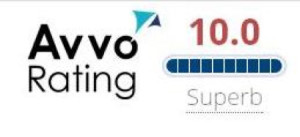 Some things you can do right now include having a bunch of lawyers say good things about you. That makes a difference. You get points for doing things. There are certain activities where AVVO has a program for increasing your rating. I have a National Trial Lawyers Award. I put that in and it shoved me up to 10.0.
Some things you can do right now include having a bunch of lawyers say good things about you. That makes a difference. You get points for doing things. There are certain activities where AVVO has a program for increasing your rating. I have a National Trial Lawyers Award. I put that in and it shoved me up to 10.0.
Time. The longer you’re in practice, the better your rating is.
You don’t get points for CLE, but if you teach a CLE course, then you get points. If you’re a member of the Florida bar, no points. But if you’re an officer in certain professional associations, then you’ll get points.
11. What other suggestions do you have for lawyers regarding attracting new clients or generating leads from directory listings and third-party citations?
This is bigger picture, just get active. It can’t hurt doing things that win you awards. Start marketing yourself online and get recognized for winning trials. Do good things for the clients that you have and get them to review you. Build your trust indicators. People read that stuff and they’ll trust you.
If you’re brand new, then you can write for your bar association. Get published and put that on your AVVO profile and your website. Get listed in the directories. A bunch of people reviewing your practice will make you stand out. It will show you as an expert.
One attorney in North Florida has a radio show. He doesn’t even talk about law matters much. He talks about politics and other stuff and people call him because they see him as an expert.
Takeaways
Work on building trust. Your first priority should be to do a good job for your clients. Then, ask them to write a review of your law practice. Build your trust indicators, get in AVVO, work on building your attorney rating at AVVO, then start with the big directories and work your way through the primary, secondary, and tertiary data sources.
Eventually, you’ll be listed all over the place, but you have to get listed in those primary sources first and do things that earn you trust among your peers and clients.

